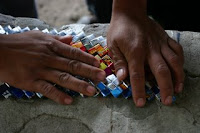
From Guatemala trash to New York Treasure
The dream of Nathalie Verwilghen is coming true, and the waste weavers are on their way to have a bite of the Big Apple for spring! New York distributors Shari and John, proprietors of ALTIPlANO (altiplan@together.net, 802 258 4899 ) will be wholesaling the Waste Weavers line in New York. They will test market the product in museum shops and high end boutiques…
The dream of Nathalie Verwilghen is coming true, and the waste weavers are on their way to have a bite of the Big Apple for spring! New York distributors Shari and John, proprietors of ALTIPlANO (altiplan@together.net, 802 258 4899 ) will be wholesaling the Waste Weavers line in New York. They will test market the product in museum shops and high end boutiques…
With the amount of trash we produce locally, recycling became one of the community’s main’s concerns. Poverty is still a problem here in Jaibalito. Poverty is very difficult for single mothers and many children. How to transform the trash into wealth? How to transform poverty into abundance? This was the challenge Nathalie was facing!
Much of the trash is snack bags. Snack bags collect in drifts like sand dunes. Snack bags are made of VERY DURABLE plastic. The plastic will last several lifetimes. The bags are covered with colorful graphic designs. Many bags have a metallic inner surface.
The
 women of Jaibalito are weavers. Nathalie paid women to learn to weave the bags into an attractive fabric. The problem for Nathalie was to design products to make of the fabric. Many things were tried. This Handbag/Wallet idea seems to be the most utilitarian while still taking advantage of the beauty of the woven snack bags.
women of Jaibalito are weavers. Nathalie paid women to learn to weave the bags into an attractive fabric. The problem for Nathalie was to design products to make of the fabric. Many things were tried. This Handbag/Wallet idea seems to be the most utilitarian while still taking advantage of the beauty of the woven snack bags.What really makes Waste Weavers different from other bag weavers, Mexican and Chinese bag weavers, is that we recycle. Others buy unused bags in rolls. Our materiel comes from the dumps in the coffee plantations and the village street.
Mayan woman have the talent for color and pattern that is well expressed in the fabrics made for these Handbags.
The Training program has trained 260 women and children. The training program is supported by an NGO, Creciendos Bien-S.O.S.E.P. and the Jaibalito Train Station, an art gallery and training facility Located in Jaibalito.

Twenty women have been employed to make the bag fabric for this product. They were selected as the best in weaving and color composition. Developing design in the weaving demands constant attention. The results are very rewarding.
We give thanks to Sociedad de los Obres Social de la Esposa del President S.O.S.E.P. They helped us to reach the poorest communities in the Municipio of Santa Cruz La Laguna: Tzujitzancha, Pahomel, Tzununna and Jaibalito. With the help of S.O.S.E.P. Nathalie was able to include the bag weaving training program in The Solola’, Departmental Capacitaccion program. Recycling has become a reality.
Th
 e women are also finding out that eating snacks is not healthy. The Waste Weavers and the Jaibalito Train Station, think trash is in fashion.. Creativity brings a smile to everyone’s face. There is a Recycling movement, it is hip, and it is to everyones’s advantage to contribute and be part of it.
e women are also finding out that eating snacks is not healthy. The Waste Weavers and the Jaibalito Train Station, think trash is in fashion.. Creativity brings a smile to everyone’s face. There is a Recycling movement, it is hip, and it is to everyones’s advantage to contribute and be part of it.
In the press recently :
http://prensalibre.com/pl/2007/octubre/21/185607.html
http://www.elperiodico.com.gt/es/20070929/14/44157/

2 comments:
Thank To Guido Bondioli to help me with the texte.
Nathalie Verwilghen
Amazing Nash!
It seems it is finally all coming together!
Congratulations!!
Keep up the good work
Ryan
Post a Comment